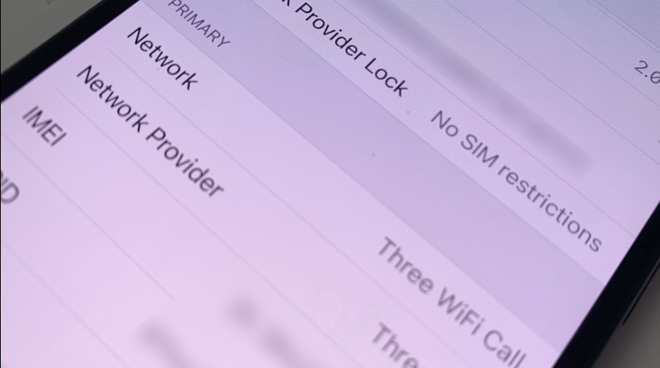UK Ban on selling locked iPhones begins in late 2021
Saying the practice discourages users from switching carriers, the UK's Ofcom regulatory body has ruled that all phones will have to be sold unlocked from late 2021.

From December 2021, all UK phones must be sold unlocked
Ofcom, the UK regulator expected to auction 5G's 700MHz spectrum in early 2021, has announced that it is to ban the sale of phones that are locked to certain carriers. From December 2021, all UK phones must be sold unlocked.
The announcement comes 11 months after Ofcom published its plan to introduce such a ban, with the only new detail being the date. Speaking at the launch of the plan in December 2019, Lindsey Fussell, Ofcom's Consumer Group Director, said that currently "Switching mobile provider can be really frustrating."
"By freeing mobile users from locked handsets, our plans would save people time, effort and money -- and help them unlock a better deal," she continued.
According to BBC News, UK networks had previously argued that locking phones helped to deter theft and fraud. However, possibly to comply with existing EU rules, four of the UK's major carriers already only sell unlocked phones.
Those are O2 -- the UK's original iPhone carrier -- plus Sky, Three, and Virgin. The remaining carriers are BT and its EE division, Vodafone, and Tesco Mobile.
"We stand ready to implement these changes when they come into force," Vodafone told BBC News. EE says it will work with Ofcom to comply.

From December 2021, all UK phones must be sold unlocked
Ofcom, the UK regulator expected to auction 5G's 700MHz spectrum in early 2021, has announced that it is to ban the sale of phones that are locked to certain carriers. From December 2021, all UK phones must be sold unlocked.
The announcement comes 11 months after Ofcom published its plan to introduce such a ban, with the only new detail being the date. Speaking at the launch of the plan in December 2019, Lindsey Fussell, Ofcom's Consumer Group Director, said that currently "Switching mobile provider can be really frustrating."
"By freeing mobile users from locked handsets, our plans would save people time, effort and money -- and help them unlock a better deal," she continued.
According to BBC News, UK networks had previously argued that locking phones helped to deter theft and fraud. However, possibly to comply with existing EU rules, four of the UK's major carriers already only sell unlocked phones.
Those are O2 -- the UK's original iPhone carrier -- plus Sky, Three, and Virgin. The remaining carriers are BT and its EE division, Vodafone, and Tesco Mobile.
"We stand ready to implement these changes when they come into force," Vodafone told BBC News. EE says it will work with Ofcom to comply.

Comments
Notice BT is one of last carrier still licking phone that is government backed carrier. BY does not want people just walking away.
BT is a public corporation. It isn’t significantly government backed outside of some network infrastructure contracts and hasn’t been for years.
Phone locking is an incentive for phony calling plans with hidden costs, and allows carriers, even after equipment has long been paid for by correspondingly more expensive calling plans, to keep charging extra, or charge outrageous “unlocking fees”.
Obviously there’s no free lunch, but people should just pay a calling plan, plus either a phone rental fee or an installment plan payment for the equipment, if they are not willing/able to pay for the phone upfront.
It’s also more responsible to not pay more expensive a phone than one can afford, or have a plan that locks one in a financial responsibility that one my not be able to fulfill in an economically uncertain environment, which then may lead to bad credit with all the ripple effects thereof.
Best to get whatever phone one can afford to pay at once, and then have a plan without contract, one can change, suspend, or cancel at any time as circumstances change.
Corporations however don’t want consumers to make smart, good choices, but choices that entangle them in dependencies.
Phones can still be locked to MVNOs.
The locking thing was probably a "scheme" pushed on to Apple by AT&T when AT&T was the only carrier available for iPhone and they demanded a way to preserve exclusivity. Who knows, perhaps AT&T provided Apple with some sort of quality of service (QoS) guarantee if iPhones were locked into to AT&T networks? The iPhone put a lot more connectivity demands on networks back then compared to most any other phone of the day. Yeah, it was a stupid idea in retrospect but Apple probably felt that they needed a special relationship with AT&T to get iPhone launched in a big way. The iPhone's success wasn't a sure thing at the time. Once the iPhone sales exploded and more carriers were brought into the mix the locking thing was probably an artifact of a standard operating procedure and the other carriers wanted in on the same deal that AT&T received.
The only carrier locked phone I ever had was an iPhone 4s purchased through AT&T. As soon as it was paid off they removed the lock, with no fee and without prompting. This is a pretty good indicator that whatever reason originally existed for carriers locking phones faded away fairly quickly. Also, the carrier subsidy gimmicky has been toned down somewhat, especially with Apple providing straightforward payment plans for the devices that bypass the carriers entirely. Why any existing carrier would continue with the prehistoric practice of locking phones defies all logic. I hope the UK ban is stated as "Hey carriers, stop being stupid!"